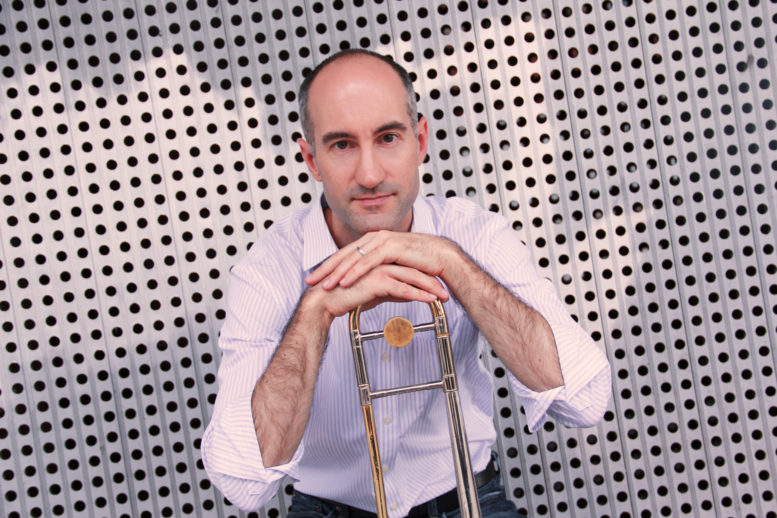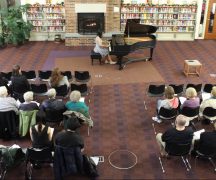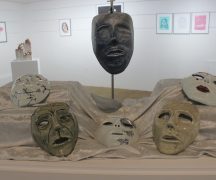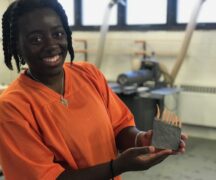By DAVID DUPONT
BG Independent News
For Grammy-nominated composer, arranger and trombonist Alan Ferber, his trip to Bowling Green is not a one-way street.
He’ll work with students, and share with them the knowledge developed over a couple decades as a professional musician as they work to master his big band charts. That will give them “an intense experience of playing music with the guy who wrote it. I know it was like that with me when I was in college.”
He’ll also get to hear some of his music written for a nine-piece group performed by local professionals. Hearing this nonet music played by a different set of musicians, most of whom he hasn’t met before, is fun, he said.
He does know David Bixler, head of the Jazz Studies program at BGSU, who will play alto sax in the nonet. He and Bixler played in Toshiko Akiyoshi’s Jazz Orchestra together. It was Bixler who arranged Ferber’s visit to campus.
Ferber is the guest artist for Jazz Week at the Bowling Green State University campus. He’ll perform a free nonet concert with the faculty and guests on Wednesday at 8 p.m. in Bryan Recital Hall, and Friday with the Jazz Lab Band I at 8 p.m. in Kobacker Hall. Tickets are $7 and $3 for students in advance and all tickets are $10 the day of the show. Call 419-372-8171 or visit www.bgsu.edu/the-arts/. See http://bgindependentmedia.org/bgsu-arts-events-through-april-4/ for a schedule of Jazz Week events.
Ferber said in dealing with students, his first job is putting them at ease. There can be certain misconceptions about how he’ll react. At a previous residency at another school one student asked: “Will he be mean?”
“The first thing I try to impart on them is we’re all living breathing humans that all have universal needs. We’re just real people,” he said. “Then I try to give them the experience of a person that’s been doing this a long time as a professional in New York City. It gives them a glimpse of something they may want to do.”
Not that the scene they step onto is the same as what Ferber encountered 20 years ago when he arrived in New York. “It’s a different world now then when I started. The entire industry has completely reinvented itself.”
The internet and social media have changed the landscape. Selling records isn’t profitable for companies anymore. More than ever musicians’ careers are left up to them. The digital revolution that destroyed the old model, now provides them with the tools to build a new model.
“It is kind of a dark picture,” he said. “On the other hand there’s probably more hope than ever for young musicians if they’re willing to be really proactive, if they have a vision for themselves and make things happen.”
As a teacher at New York University, he sees what his students encounter. “What I’ve noticed is the students who are most successful right now are creating a lot of content around their creative endeavors and just distributing themselves, branding themselves, and marketing themselves using social media. There’s a lot to be optimistic about in that regard. They grew up in this world. They’re in good shape to take advantage of all these tools and make a go of it.”
Ferber, who grew up in Moraga, California in the San Francisco Bay area, got his start early in music. He started playing piano when he was 4. When he was 10, he picked up trombone. It wasn’t really his choice. “I had long arms,” he said, so he could reach the furthest position on the slide. At 14, he went to a jazz workshop. “It was there that I finally heard many people who could really play this music,” including some his own age. “When I heard the sound, the style, it just hit me in a certain way, and I just wanted to learn about it.”
Ferber started studying with veteran session player Dean Hubbard – the guy who played the voice of the teacher in The Peanuts’ TV specials. At the end of one lesson, Ferber asked about jazz improvising. So Hubbard put on a Jamey Aebersold play-along record. It was a simple 12-bar blues in F. First he fumbled for a few choruses, then Hubbard blew. His improvising inspired Ferber. He had recorded the lesson and brought the tape home and memorized his teacher’s solo.
From there, he started buying jazz records. John Coltrane’s “Blue Train,” which features trombonist Curtis Fuller, was his first purchase and still one of his favorites.
His twin brother played drums. They jammed together, inviting friends over to join them. That experience was crucial to his development. “I mean I can’t imagine learning this music in a vacuum,” he said. Some people think learning jazz is spending hours in a practice room. “It’s a communal music. I’m going to practice on my own, but I’m going to try this out with other human beings. That’s where you really develop, and really learn to play a melody and learn to interact.”
He went to UCLA on a music scholarship, but actually studied economics. He was able to keep the scholarship as long as he played in ensembles. Ferber spent more time in the music building than in economics classes.
He launched his professional career in the Los Angeles area, picking up jobs as he could, sitting in, playing $10 a night big band gigs.
“I was making a living. My network started expanding rapidly,” he said. He was starting to write music and was looking to find opportunities to play it.
A couple years after graduating from UCLA, he was talking by telephone to a friend in New York. The friend had an empty room in his apartment and wondered if Ferber wanted to move in.
“All my favorite jazz records were coming out of New York. Things I was obsessively checking out. I wanted to play with these people or at very least hear them live,” he said.
So he packed up his trombones, booked a flight and flew out. “I didn’t think too much about it. … In retrospect it was a really irresponsible decision.”
Yet, he knew, if he got too established in L.A. it would become all the more difficult to uproot himself.
He didn’t have but one friend in the city, didn’t have a network. He did have the same attitude about how to build a career. He played as much as he could, and with as broad a range of musicians.
“I’ve always been about putting myself into as many musical situations as possible, not just jazz,” he said. It could be rock, hip-hop and “everything in between.”
“At this point, it’s been so diverse. … The more you hear, the more you absorb, the more it integrates into your style. Being an active trombonist, having played with so many composers, I’m informed by all of that.”
He has playing or writing credits on more than 150 albums. He’s played with a who’s who of jazz musicians. His experience extends beyond that to work with Peter Gabriel, Paul Simon, Sufjan Stevens, The National, Dr. Dre, Harry Connick Jr., Michael Buble and Beirut.
Ferber advises students to take a similarly broad-minded approach. “I’m a big advocate for going out to hear people. Listening is practicing. The more you do, the more unique you become.”





